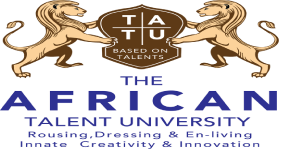ACCREDITATION & RECOGNITIONS
“Accreditation” is review of the quality of higher education institutions and programs. The federal government requires that a college, university, or program be accredited in order to be eligible for federal grants and loans or other federal funds.
Many other governments (Africa included) have followed the same approach to ensure that qualifications issued by universities and colleges are recognized nationally and globally.
The Africa Talent University is also keen on the issuance of genuine and verifiable documents. And as such the university achieves Credit Transfer to 142 International Universities that are accredited in the countries and listed in the UNESCO Handbook of Internationally Recognized Universities. This is for Normal Transcripts and Certificates.
In the case of Talent Transcripts and Certificates, the same must be approved by World Talent Federation and the same backed by UNESCO. It may be possible that one the member universities (especially the Ivy League Universities) may endorse these documents.
Please click here for the list of approved UNESCO Listed Universities. All our recommended universities must be in this list.
UNESCO GOALS
Education transforms lives and is at the heart of UNESCO’s mission to build peace, eradicate poverty and drive sustainable development.
UNESCO believes that education is a human right for all throughout life and that access must be matched by quality. The Organization is the only United Nations agency with a mandate to cover all aspects of education. It has been entrusted to lead the Global Education 2030 Agenda through . The roadmap to achieve this is the Education 2030 Framework for Action (FFA).
UNESCO provides global and regional leadership in education, strengthens education systems worldwide and responds to contemporary global challenges through education with gender equality an underlying principle.
Its work encompasses educational development from pre-school to higher education and beyond. Themes include global citizenship and sustainable development, human rights and gender equality, health and HIV and AIDS, as well as technical and vocational skills development.
The 2030 Agenda for Sustainable Development is an ambitious, aspirational and universal agenda to wipe out poverty through sustainable development by 2030. When it adopted the new Agenda in September 2015, the international community recognized that education was essential for the success of all 17 of its goals. Ambitions for education are essentially captured in Sustainable Development Goal 4 which aims to “ensure inclusive and equitable quality education and promote lifelong learning opportunities for all”.
Through the Incheon Declaration adopted at the World Education Forum in May 2015, UNESCO, as the United Nations’ specialized agency for education, was entrusted to lead and coordinate the Education 2030 agenda with its partners. The roadmap to achieve the ten targets of the education goal is the Education 2030 Framework for Action, adopted in November 2015, which provides guidance to governments and partners on how to turn commitments into action.
Education 2030 goes beyond past attempts to ensure access to basic education, as set out in the Education For All goals and the education-related Millennium Development Goal 2 of 2000-2015.
The Global Education 2030 Agenda new expanded scope:
- reaches from early childhood learning to youth and adult education and training;
- emphasises the acquisition of skills for work;
- underlines the importance of citizenship education in a plural and interdependent world;
- focuses on inclusion, equity and gender equality;
- and aims to ensure quality learning outcomes for all, throughout their lives.
At the heart of all these, and for the reason that the UNESCO goals in education may be missed by more than 50 years, are the ideals of World Talent University. It would baffle everyone that after very many years and with billions and billions of dollars in education, we still cannot solve basic items in the global goals.
Our Talent Agenda brings in fresh and most encompassing solutions for the new millennium and that is why we are part of the UNESCO global agenda for learning.
We work with universities and institutions that are recognized by UNESCO and listed as credible.
Please click here to access the institutions that we recommend.
The list contains the names of all Universities and University level institutions, as provided to IAU (International Alliance of Universities Division) by National authorities and competent bodies from 196 countries around the world. The list further contains over 18.000 University level institutions from 196 countries and territories.
